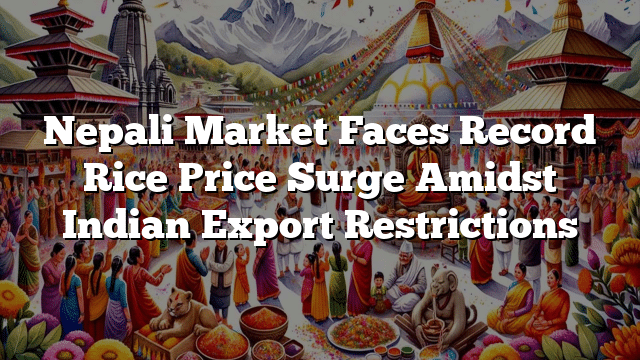
Rice prices in the Nepali market have soared to unprecedented levels, witnessing an increase of Rs 800 per kg per 25 kg bag over the past year, as reported by the National Consumer Forum’s market analysis.
This surge in prices has been attributed to India’s restrictions on non-basmati white rice exports, given its status as the world’s largest rice exporter, commanding up to 40 percent of the global market share.
The National Consumer Forum highlights that food inflation in Nepal persists, driven primarily by the escalation in rice prices and other essential food items. Last year, India’s ban on non-Basmati white rice exports aimed to safeguard its food reserves amidst potential disruptions caused by El Nino.
The repercussions of this export ban have been significant, with the prices of various rice varieties, such as pearl jeera masino, experiencing substantial increases. Additionally, the imposition of a 20 percent duty on parboiled rice exports further exacerbated the situation.
Moreover, sugar prices have fluctuated, with retail prices rising from Rs 90 to Rs 110 per kg. Despite India’s quota-based sugar exports to Nepal, the government’s failure to import sugar has worsened the scenario.
Similarly, the prices of wheat flour and refined flour have surged by approximately 30 percent in the market, posing additional challenges to consumers.
Prem Lal Maharjan, president of the National Consumer Forum, emphasizes the need for government intervention to curb rising prices, highlighting the country’s dependency on food imports from India. Despite India’s allowance of quota-based food exports, Nepal’s government has been slow to respond, exacerbating market volatility and economic impacts.
The recent surge in food prices has been attributed by Nepali traders to India’s ongoing general elections. Given Nepal’s reliance on India as a key trading partner for food imports, any protectionist measures adopted by India significantly affect Nepal’s market dynamics.
According to reports, India is unlikely to lift export bans on rice, wheat, onion, and sugar anytime soon, as the priority of Prime Minister Narendra Modi’s government is to stabilize domestic prices.
The National Consumer Forum has called upon the Office of the Prime Minister to address the issue urgently, emphasizing the detrimental effects of rising prices on individuals, particularly those in the low-income bracket.
In response, the forum submitted a memorandum to the Prime Minister’s Office, urging prompt action to alleviate the burden on consumers.
While Nepal Rastra Bank reports a slight moderation in consumer price inflation, food prices remain staggeringly high, underscoring the need for comprehensive measures to address market challenges and ensure economic stability.
Related:



